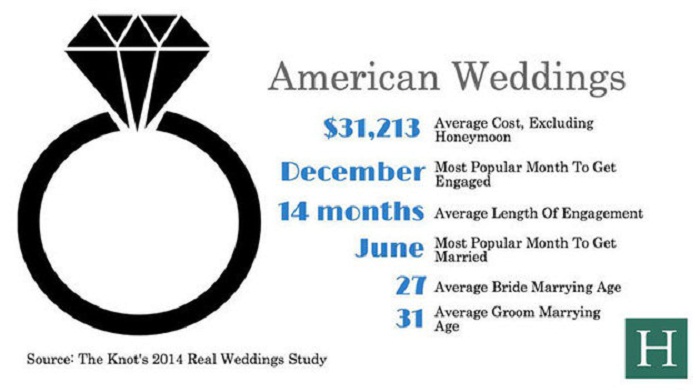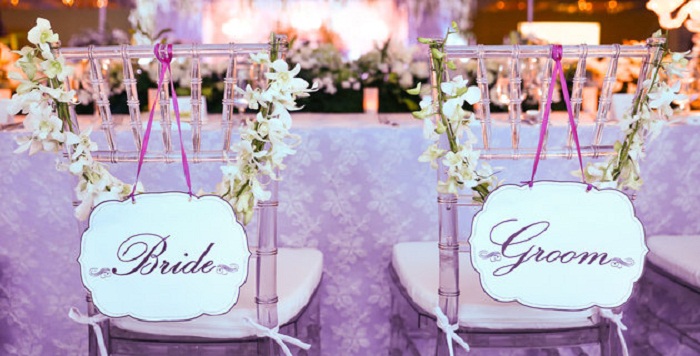"Weddings hit on money, family dynamics, growing up, commitment, issues of identity, body image and appearance, expectations that come with ‘the happiest day of my life’ and ‘happily ever after,’" says Dr. Jocelyn Charnas, Ph.D. "Then it turns up the volume."

The American wedding industry, now a $55 billion market, is fueled by publications and media coverage espousing a “perfect” event. Against the backdrop of sparkling engagement rings and pastel floral arrangements, discussing fears and worries about merging two lives may seem indicative of a relationship that’s not marriage material. But that’s simply not the case. Becoming engaged is an emotionally complicated stage of adult development, and conflicts arise when we fail to treat it as such.
"Weddings and marriage are among the most transformative decisions of our lives," says Charnas. “When we`re changing and growing it can come along with some hurt."
The good news? Experiencing feelings of sadness, uncertainty and anxiety is natural and can even become a healthy part of the process. After planning her own nuptials and watching peers navigate jittery paths to the altar, Charnas dedicated a portion of her therapy practice to what she describes as preventative medicine: premarital counseling for engaged couples.
"Weddings and marriage are among the most transformative decisions of our lives." Dr. Jocelyn Charnas, Ph.D.
When a couple is able to acknowledge and explore the major changes occurring, they have the opportunity to develop skills that strengthen their relationship and future marriage, adds Charnas. When they don`t, feelings may get taken out elsewhere.
“Whatever anxieties may exist about marriage (Am I making the right choice? Is this the right time?) may get displaced onto the day itself,” says clinical psychologist Dr. Barbara Bernstein, Ph.D., M.P.H. “Questions about ‘Why am I feeling so anxious?’ may not get examined, but instead may get thrown on to questioning the venue or obsessing over the dress. That could be crushing pressure."

Wedding planning can be a whirlwind, and couples often take out those stresses on each other.
What`s more, the marital engagement period brings on big changes for parents, siblings and friends who are involved, too. So couples find themselves "trying to create a new equilibrium among many moving parts," says Bernstein. That`s extremely difficult to do. When examined through the lens of emotional development rather than party planning, it becomes obvious why weddings make people say, do and spend in ways they would never before.
“Weddings and marriage are about transition, and that can come with feelings of an actual loss or a fear of loss.” adds Charnas. “It’s not just a parent losing a child. It can be a loss of youth, independence, loss of the idea of a certain lifestyle. Fundamentally, it`s something that`s difficult to deal with. And it`s more difficult to deal with when you`re not aware that`s what you`re feeling.”
“Whatever anxieties may exist about marriage may get displaced onto the day itself”, says Dr. Barbara Bernstein, Ph.D., MPH.
So what do we do? We act out. Some micromanage the budget, others agonize over minutiae like personalized mason jar party favors, or whether a distant cousin can bring a new fling to the rehearsal dinner. Invariably, we argue.
Religious ceremony officiants, like priests or rabbis, often offer faith-based premarital counseling sessions, which may not be enough considering the length of engagements and the scope of weddings today. And since a growing number of people -- especially millennials -- are identifying as religiously unaffiliated according to a recent Pew report, many couples may find formal premarital counseling absent from the planning process entirely. Or they may not agree that a clergy member is the appropriate advisor to begin with.
Weddings and marriage are about transition, and that can come with feelings of an actual loss or a fear of loss”, says Dr. Jocelyn Charnas, Ph.D.
Even so, Charnas suggests couples have those conversations on their own if they don`t have access to a neutral third party.
"The real truth is life doesn`t get any easier. The wedding is not the end, it`s only the beginning, and life only gets more complicated as we get older," says Charnas. "Couples should set aside time each week to talk about how they are feeling about the wedding-planning process, both the good and the bad. Getting into the habit of open and honest communication is good practice for marriage."
Even when it feels unromantic compared to planning a party that’s designed to look like an airbrushed fairy tale, there`s work to do on the quality of your partnership. Why? Because you’re getting married, and that changes your relationship profoundly -- that’s why you wanted to take this step the first place, right?
















































